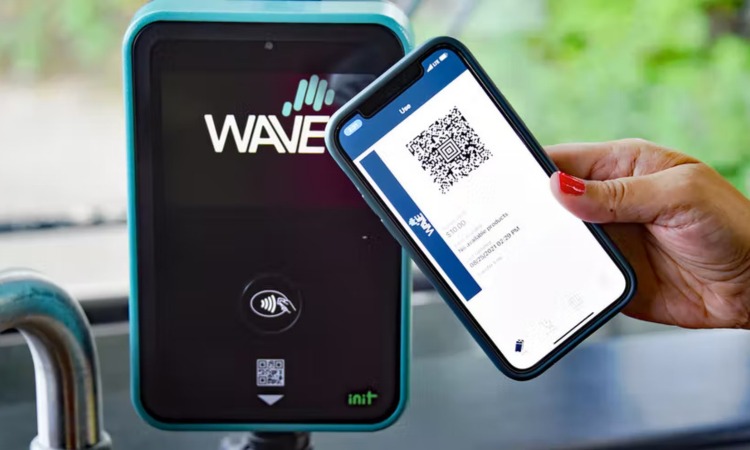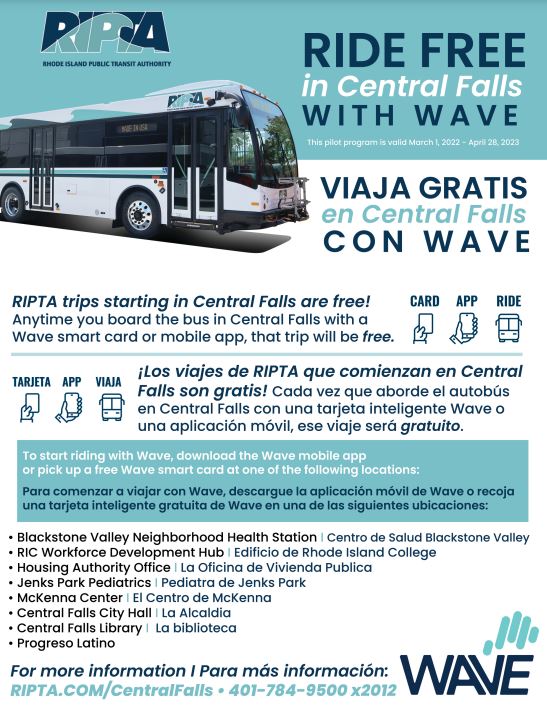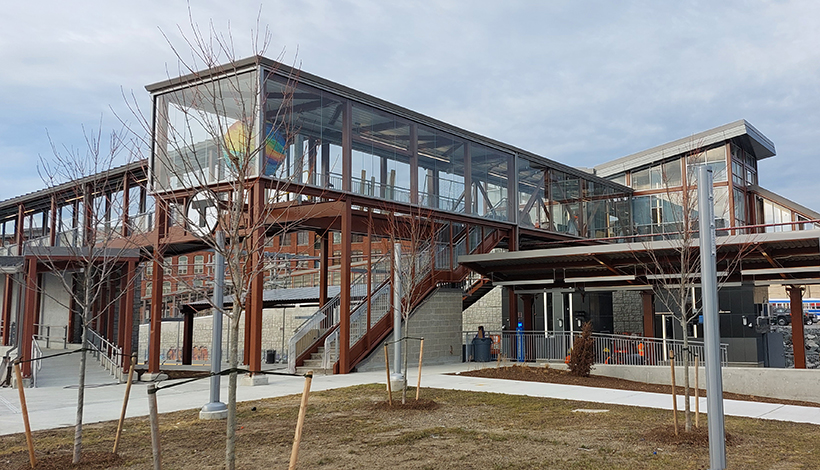RIPTA is making Wave(s) with their Ride Free in Central Falls Program
20 minutes Author: Shared-Use Mobility Center Date Launched/Enacted: Aug 1, 2023 Date Published: August 1, 2023
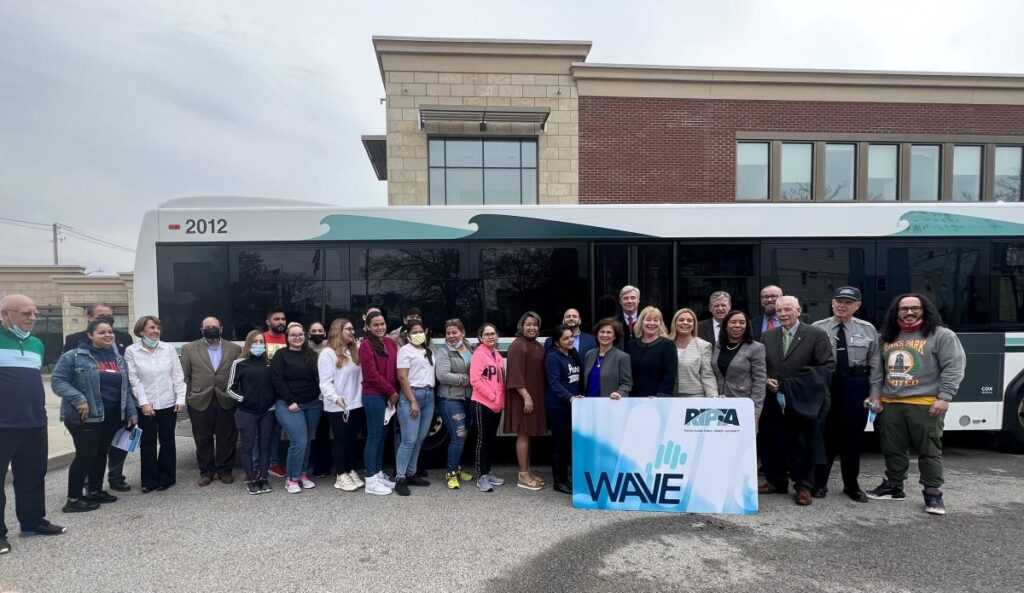
Summary
- In 2020, the Rhode Island Public Transit Authority (RIPTA) received an Federal Transit Administration (FTA) grant to deploy and monitor a geofencing functionality within Wave’s smart ticketing technology with the intention that it could lead to new partnerships and opportunities to incentivize the use of public transportation. For Instance, RIPTA could use this functionality to charge transit users a discounted fare rate if they boarded in a geofenced zone.
- As a part of the Ride Free Central Falls program, RIPTA created a geofenced zone around the City of Central Falls. Those who use Wave cards or the Wave smartphone application to board a bus in Central Falls can take a one-way trip at no cost.
- RIPTA chose the City of Central Falls as a suitable test ground for the geofencing technology because it covers a small geographic area but has a high population density and public transit need.
- In May 2023, RIPTA announced its plans to extend the Ride Free Central Falls Program and expand its boundary to include the Pawtucket-Central Falls Transit Center. The program, initially launched in March of 2022 and set to run for a year, will now operate until December of 2023.
This pilot project is part of the Mobility Innovation Collaborative (MIC) program. The MIC program provides a comprehensive suite of technical assistance resources, promotes knowledge sharing activities, and captures stories and lessons learned from nearly 50 innovative mobility projects across the United States.
Originally published August 2023, revised June 2025.
Introduction
The Rhode Island Public Transit Authority (RIPTA) received a Federal Transit Administration (FTA) Accelerating Innovative Mobility (AIM) Grant to support their Ride Free in Central Falls Program, an initiative that is testing the effectiveness of geofencing technology to promote use of public transportation. The Ride Free Central Falls program uses geofencing technology to enable one-way free transit rides for individuals who board within the City of Central Falls’ boundary using a Wave smart card or mobile application.
History of the Project
Rhode Island Public Transportation Authority is one of the few transit agencies in the country responsible for providing fixed-route and ADA paratransit services at a statewide level. RIPTA currently operates a fleet of 240 buses and 109 paratransit/flex vehicles buses across 37 out of the 39 municipalities in the state.
In 2020, RIPTA received $244,000 to partner with the City of Central Falls to test the effectiveness of using geofencing technology to help create targeted promotional partnerships that would benefit transit and the public. The City of Central Falls is contributing approximately $50,000 to the project and RIPTA is contributing $11,000. The project funding includes covering lost fare revenue for RIPTA.
The Ride Free Central Falls pilot originated from conversations taking place nationally regarding zero-fare transit and budgetary shortfalls many public transit entities face or expect to face in the coming years. Early on, the pilot program received political support from Rhode Island’s federal and state officials, including Governor Daniel J. McKee, Lt. Governor Sabina Matos, Secretary of State Nellie M. Gorbea, and U.S. Senator Sheldon Whitehouse, because it allows RIPTA to promote effective ridership while setting the stage to test new economic development strategies later down the line. By exploring how fare policy can influence ridership and how innovative technologies can capture meaningful data sets, RIPTA will be better equipped to make informed decisions about future service and support accessible, equitable, and user-first transportation.
The Ride Free Central Falls pilot is conducted within the broader context of RIPTA moving away from paper products (i.e. paper tickets, and passes) and transitioning to a smart fare payment system called Wave. In September of 2020, RIPTA launched Wave, an account-based fare collection system that allows passengers to pay their bus fare with a reloadable smart card or mobile application. With an account-based payment system, fare cards and Wave’s mobile phone app are associated with an account that allows riders to load money, buy passes, and access fare discounts. Therefore if a rider loses their fare card, any remaining balance on the rider’s account is saved and can be transferred to a new card. Wave is part of a larger conversation about the future of mobility and how fare collection and policy play into that. Utilizing geofencing technology in this pilot allows RIPTA to uncover shortfalls within the Wave system that need to be better communicated to the public.
Goals of the Project
As RIPTA explores new technologies to promote mobility innovation, the main objective of this demonstration project is to test geofencing technologies. Making rides fare free intends to offer an incentive to riders to participate in this pilot project, however, the project’s primary focus is on the technology that enables the zero-fare zone. If the functionalities of the geofenced zone are successful, RIPTA will have access to ridership data that can inform future transit policy on a city, state, and national level.
Geofencing technology is a service that utilizes Global Positioning System (GPS) signals to set up virtual boundaries around an area of interest. Once a mobile device or other tracked object enters a geofenced zone, the technology will send out a notification or alert. In this project, geofencing is not only being used to enable contactless fare payment and ticketing systems, it is paving the way for RIPTA to establish marketing partnerships that promote the use of RIPTA’s products and services. For instance, if a local business is hosting a promotional event and looking to encourage attendance, it could partner with RIPTA to leverage the geofencing functionality to help inspire people not to drive to the location. RIPTA could set up a geofence at the event location and offer a discounted transit rate to attendees.
Ultimately, the implementation of geofencing technology could potentially encourage local entities, such as social service agencies or private businesses, to sponsor ridership in specific areas, resulting in the emergence of fresh sources of funding.
Project Operations
The Ride Free Central Falls program takes place in the City of Central Falls, Rhode Island’s smallest and densest city, which spans just one square mile and is home to around 20,000 people. The community is predominantly Hispanic and Latino, and the income levels of residents are comparatively lower than in other parts of the state, which is often accompanied by a significant reliance on public transit. Central Falls geographic and sociodemographic characteristics provided an ideal foundation for RIPTA to test out geofencing functionalities on a small scale while also addressing travel needs. Central Falls provided RIPTA with a large enough participant pool concentrated in one area eliminating the complexities around picking out pilot participants through an application process.
In order to take advantage of the free rides offered through the program, RIPTA riders must download the Wave mobile app or obtain a Wave card. The geofencing software communicates with RIPTA’s Wave smart fare system and automatically waives the fare when a passenger boards with a Wave smart card or mobile app in Central Falls.
As a part of this demonstration project, 1200 Wave cards were distributed for free at various community locations within Central Falls, including Central Falls City Hall, Central Falls Public Library, McKenna Center, Central Falls Housing Authority, Jenks Park Pediatrics, Progreso Latino, RIC Workforce Development Hub, and Blackstone Valley Neighborhood Health Station. The City of Central Falls recommended these locations for card distribution as they are regularly frequented by local residents. Jenks Park Pediatrics was particularly chosen because it saw a lot of traffic during the height of the COVID-19 pandemic.
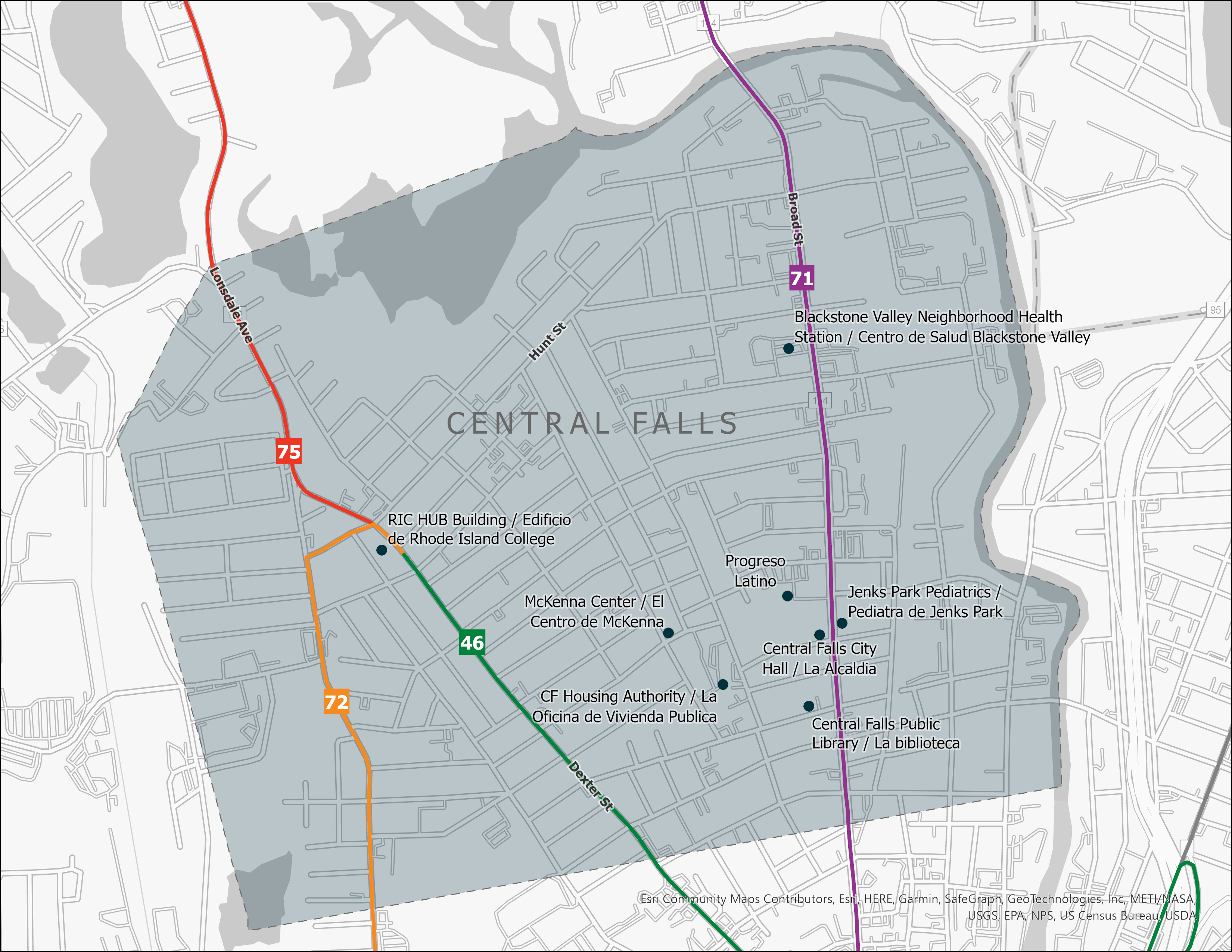
Map of Routes and Wave Card Distribution Locations in Central Falls / Credit: Rhode Island Public Transit Authority
Central Falls residents – and other RIPTA riders – who did not obtain one of the 1200 free Wave cards can purchase cards for $5 dollars only using credit, debit, or cash at specific retail locations (7-Eleven, Shaw’s and Walgreens) across the metropolitan area.
By utilizing the Wave card, RIPTA planners are now able to gather additional information important to improving service such as transfers, round trips, total fare paid by individual riders, etc. Data is collected through the onboard validators for further analysis. Once a rider taps their smart card or phone, their trip information is transferred through the cloud to the INIT reporting system which allows RIPTA staff to pull transaction data for analysis purposes. Currently, all project data is analyzed in-house by RIPTA staff.
Technology Partners
This program features two technology partners: INIT and GIRO. INIT is the developer of the Wave smart fare collection system that facilitates contactless payment boarding on RIPTA services. INIT provided RIPTA with the hardware for the system and assisted with coding support that allowed RIPTA to develop the geofencing functionality. GIRO, the scheduling software partner, provides Hastus software, the transit planning and scheduling platform RIPTA currently used for its operations. Cooperation between INIT and GIRO is critical for the Ride Free Central Falls demonstration because both systems need to communicate for the geofencing functionality to work correctly.
Outreach
Ride Free in Central Falls launched in March of 2022 when the effects of Covid-19 were still present throughout much of RIPTA’s services. As a result, RIPTA’s strategy around outreach involved forming relationships with several nonprofits in the city whose missions could be tied to the program. RIPTA worked with various community institutions, including churches, health centers, libraries, social service nonprofits, and community-based organizations, to distribute 1200 Wave cards throughout the city. While three retail locations within the City of Central Falls already provided Wave card services, not all locations provided the option to purchase and activate a card. By including trusted community partners in the card distribution, RIPTA eliminated potential confusion around getting Wave cards. These familiar community locations provided extended hours for card acquisition and additional customer service options, including assistance in Spanish, surpassing what the original sites could provide.
To promote the program, RIPTA engaged in traditional advertising methods, including sending out a direct mailer to all home residents in Central Falls notifying them of the program. Partner organizations also distributed flyers in both English and Spanish. Nevertheless, much of the outreach for the program occurred through word of mouth. Since Central Falls is a small, dense community with shared demographics, there was a higher sense of community and unity among residents, making it easier for news to travel fast regarding the Ride Free Central Falls program.
Residents could provide feedback on the service through various formal and informal channels, whether calling RIPTA’s customer service line, sharing insights with the community organizations RIPTA partnered with for card distribution, or posting on RIPTA’s social media pages.
Challenges and Lessons Learned
Covid-19 Impacts on pilot project
Similar to many agencies’ experiences, the effects of Covid-19 brought forth unexpected events that RIPTA couldn’t have accounted for during the planning phases of the pilot. Six months into the Ride Free Central Falls pilot, RIPTA had to make temporary service reductions across the system. As a result, certain fixed routes in Central Falls saw reduced service to ensure that every part of the state maintained decent service. Route 72, which connects Pawtucket-Central Falls with the western side of Providence, usually sees between 3500 and 3700 daily rides. However, ridership fell between 700 to 800 trips during the Covid-19 pandemic. While ridership reductions were a product of the service reduction, the unideal timing of this scenario made it challenging to assess the usage of the new technologies as well as the zero-fare impact of the program, as ridership numbers are a typical performance metric.
Additionally, chip shortages founded on pandemic supply chain issues made it difficult for RIPTA to distribute an additional 200 Wave Cards to residents looking to take advantage of the program. The project initially only budgeted for the distribution of 1000 Wave cards, but as the program gained popularity, the demand for cards grew among residents who had just found out about the program or had lost their initial Wave card.
Educate your target audience when introducing new technologies that impact the rider experience
RIPTA ridership has remained consistent, with around 700-800 individual riders per month. However, the difference between transit riders using cash and those paying with a Wave smart card is still split 50/50. For RIPTA, the large number of transit riders in Central Falls still using cash to board buses has emphasized how important education and outreach are to a successful project pilot. While agencies introducing new products or services should not expect their target audience to start using them immediately, efforts should be put into encouraging the switch and helping make the transition seamless. Providing clear communication to residents on obtaining a Wave smart card and uploading money onto the card are just two components that RIPTA plans to focus on with their outreach efforts moving forward.
Given that transit agencies are government entities, individuals may be reluctant to share personal information, including for account-based transit payment systems
As a feature of this program, community organizations distributed 1200 Wave cards to residents in Central Falls. However, RIPTA has found that individuals’ distrust surrounding sharing information with the government has not only challenged the transition from cash to Wave card but prevented residents from benefiting from the zero-fare program feature. Cash-based transactions remain the preferred payment method for people who choose not to share personal information despite the convenience of an account-based smart card or the financial benefits of a digital platform. Transit agencies must be sensitive to these preferences as they work with communities and individuals to promote smart payment methods.
Framing is important when marketing demonstration projects
How you frame the introduction of new services has a direct impact on whether your target audience chooses to utilize them. RIPTA found that residents of Central Falls demonstrated a greater willingness to engage with the program when a direct link was established between the program and its potential to make their daily lives more convenient. During community outreach efforts, the Blackstone Valley Neighborhood Health Station noted that residents were more inclined to participate in the program after telling them that participation in the program would help them make their medical appointments and better access healthcare.
Using account-based ticketing systems opens up new opportunities for transit data capture and standardization
Access to Wave card data has brought forth a larger discussion surrounding the consistency of ridership data and whether transit agencies are collecting the right data sets to make informed decisions. While the transportation industry is working towards standardizing data outputs (ex. transit ridership), the inputs (ex. automatic passenger counters (APC) or farebox) required to inform or build those outputs are still nebulous and vary between agencies. RIPTA is uniquely positioned to set a standard for transit data and organize it in a way that is more useful because of its position as a state-wide transit operator. While the transaction count data from the Wave system may have a higher level of accuracy because it has a timestamp correlated with an actual date, not everyone who boards a RIPTA bus utilizes a wave card. Thus, depending on your data source, numbers for ridership will differ. In the end, the data collected through this pilot continues to highlight conversations around what data sources should be relied upon to inform necessary transit datasets such as ridership counts.
Future Plans
Earlier this May, RIPTA announced the extension of the Ride Free Central Falls Pilot through August 1st, 2023. Then, in late July, RIPTA announced the program would be extended through the end of the year. While initially set to run as a one year demonstration pilot project, RIPTA leveraged remaining funds from the AIM grant to continue the Central Falls Program and extend the geofencing boundary to include the recently opened Pawtucket-Central Falls Transit Center. RIPTA hopes that including the Pawtucket-Central Falls Transit Center in the Ride Free program will not only promote the use of the new facility but prompt people to consider taking multi-modal trips from the Pawtucket and Central Falls areas to Boston, Massachusetts.
Conclusion
The Ride Free Central Falls Program exemplifies how an agency could use innovative transportation technologies to enable local businesses and residents to buy into public transportation. While the program is a technology-first demonstration project, the testing of geofencing capabilities lays the groundwork for an improved transit strategy and makes transit a more accessible and affordable option for residents. Fundamentally, geofencing is one tool in RIPTA’s toolbox to promote ridership, generate new funding streams, and improve overall service operations.

